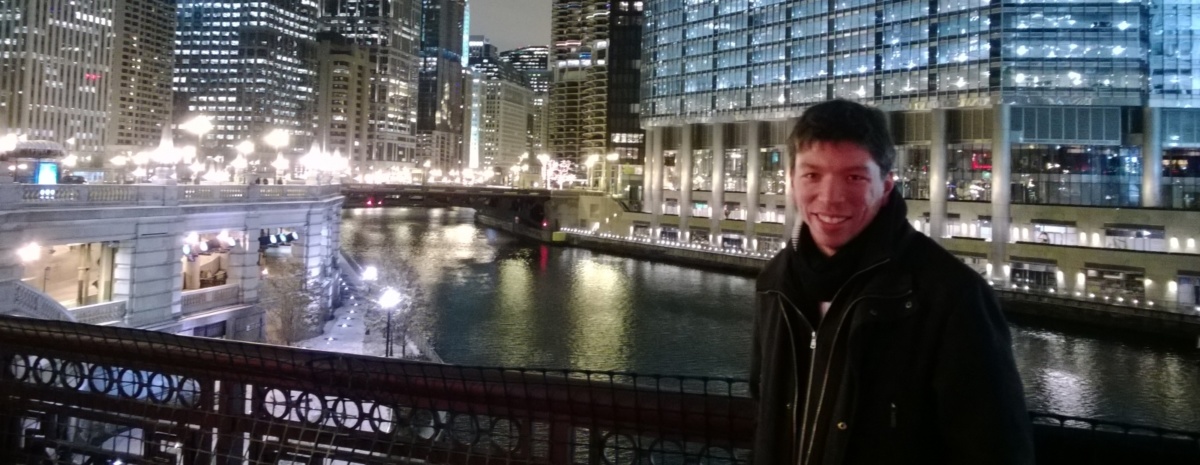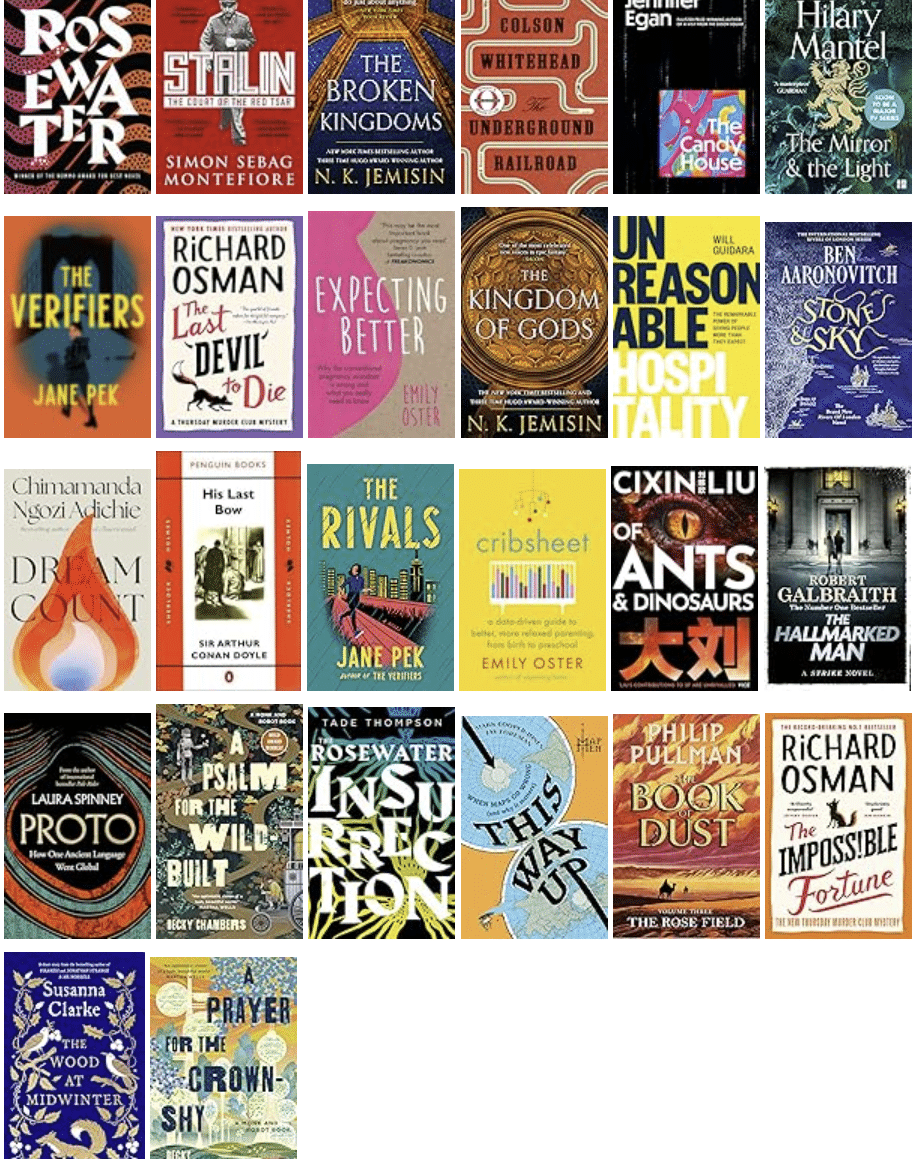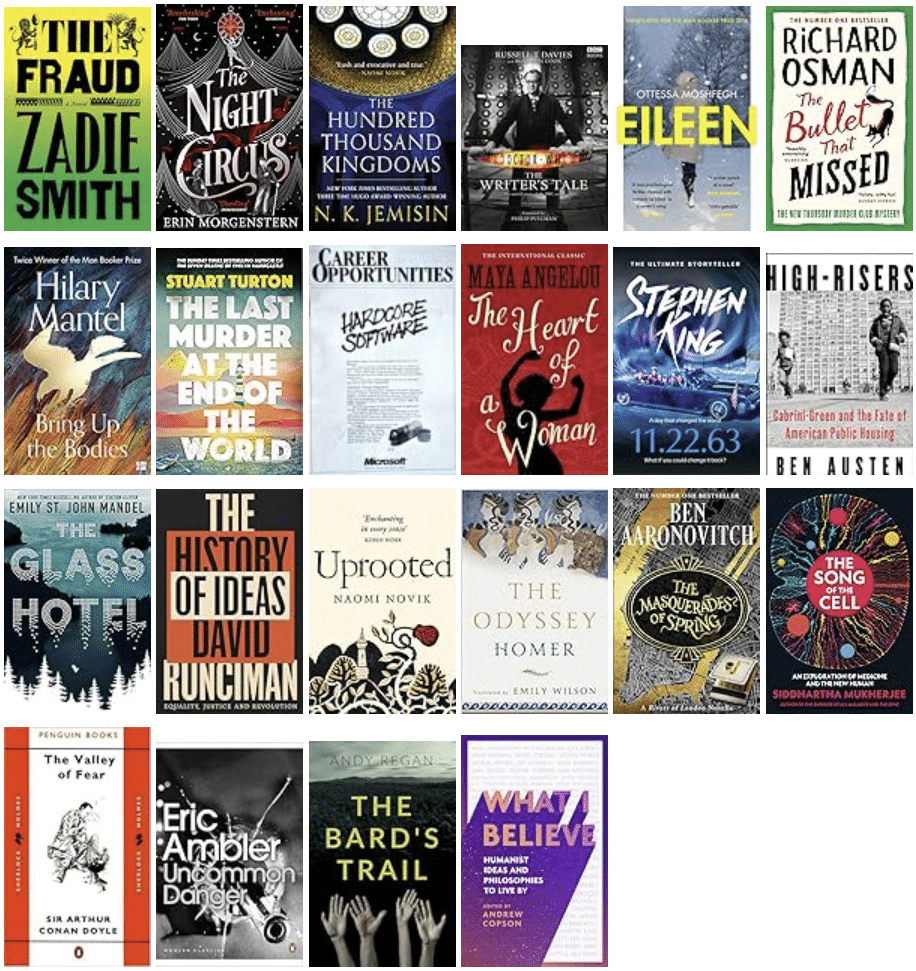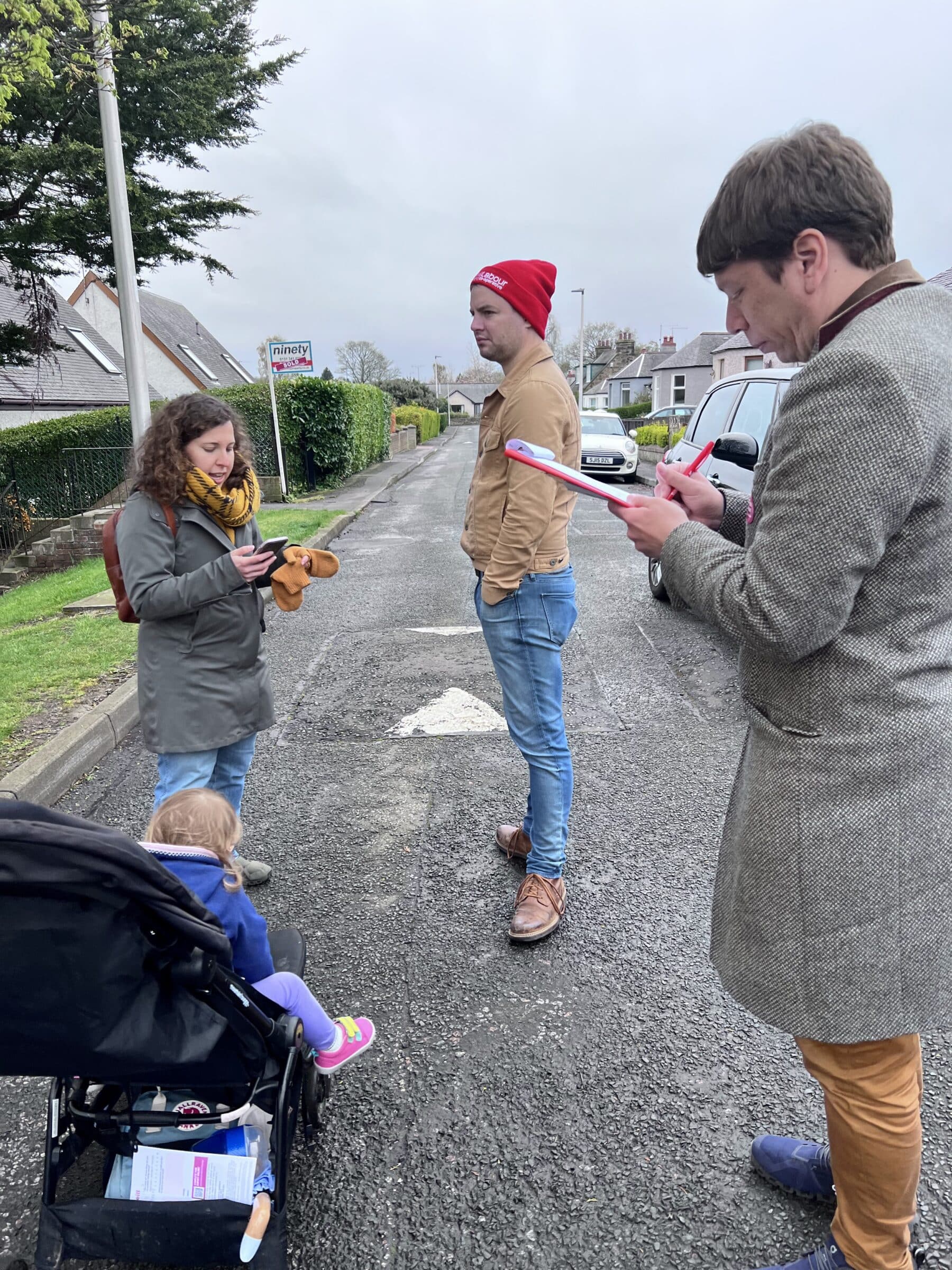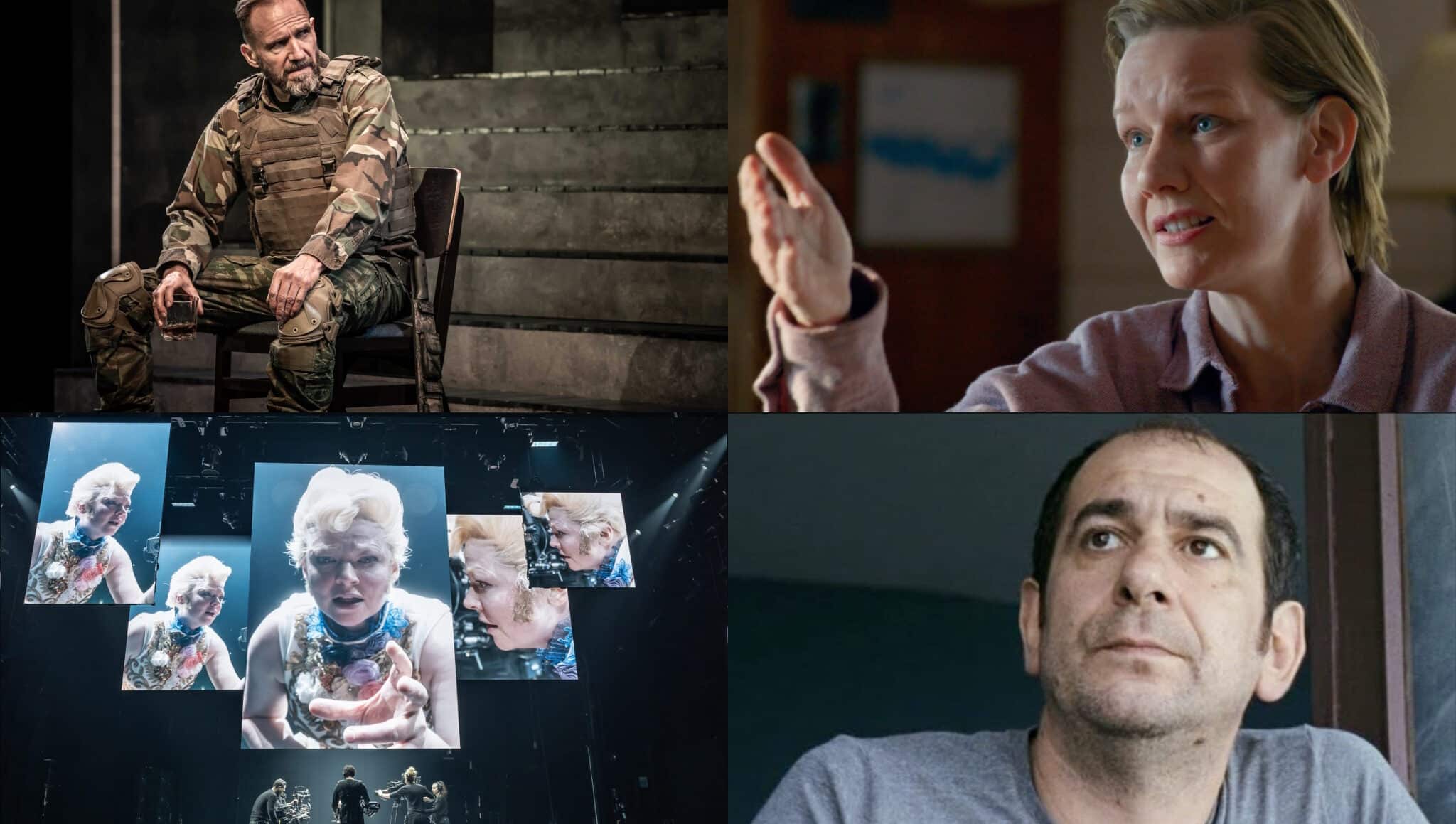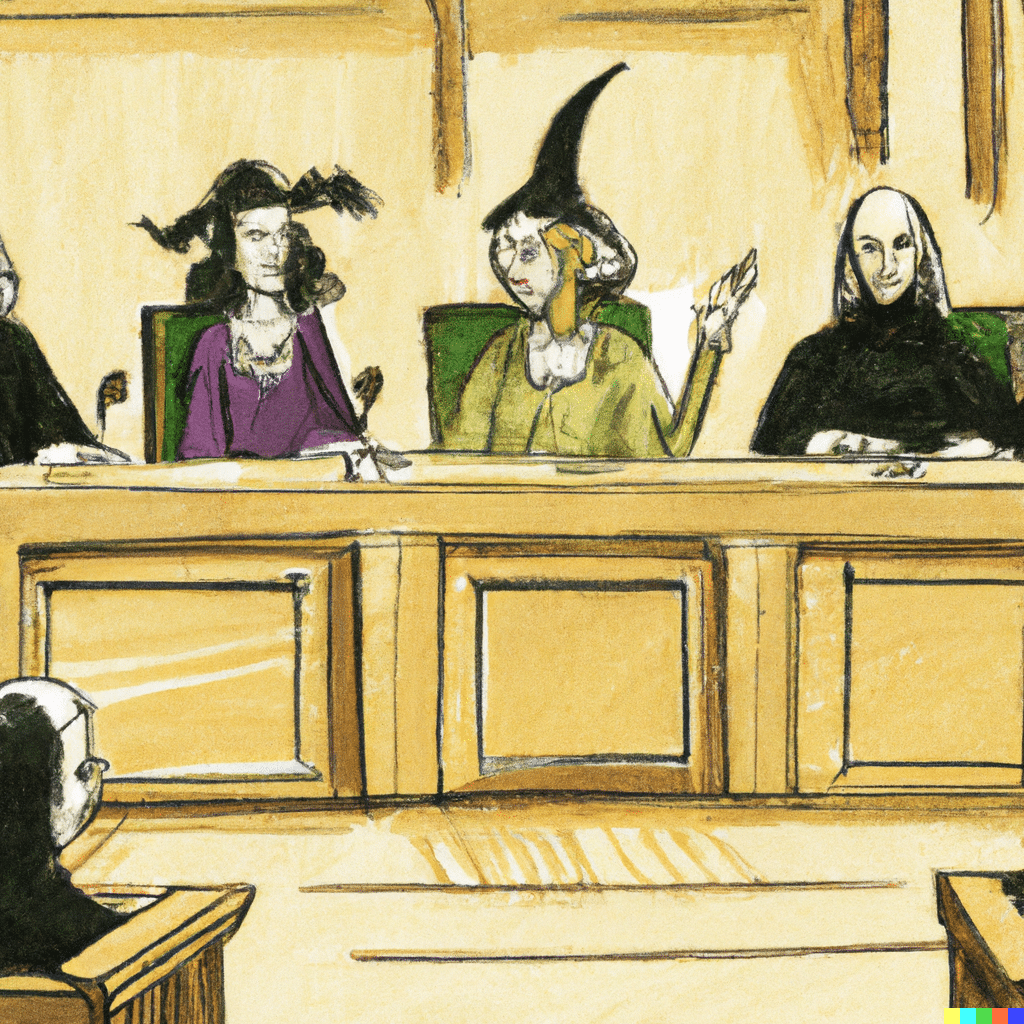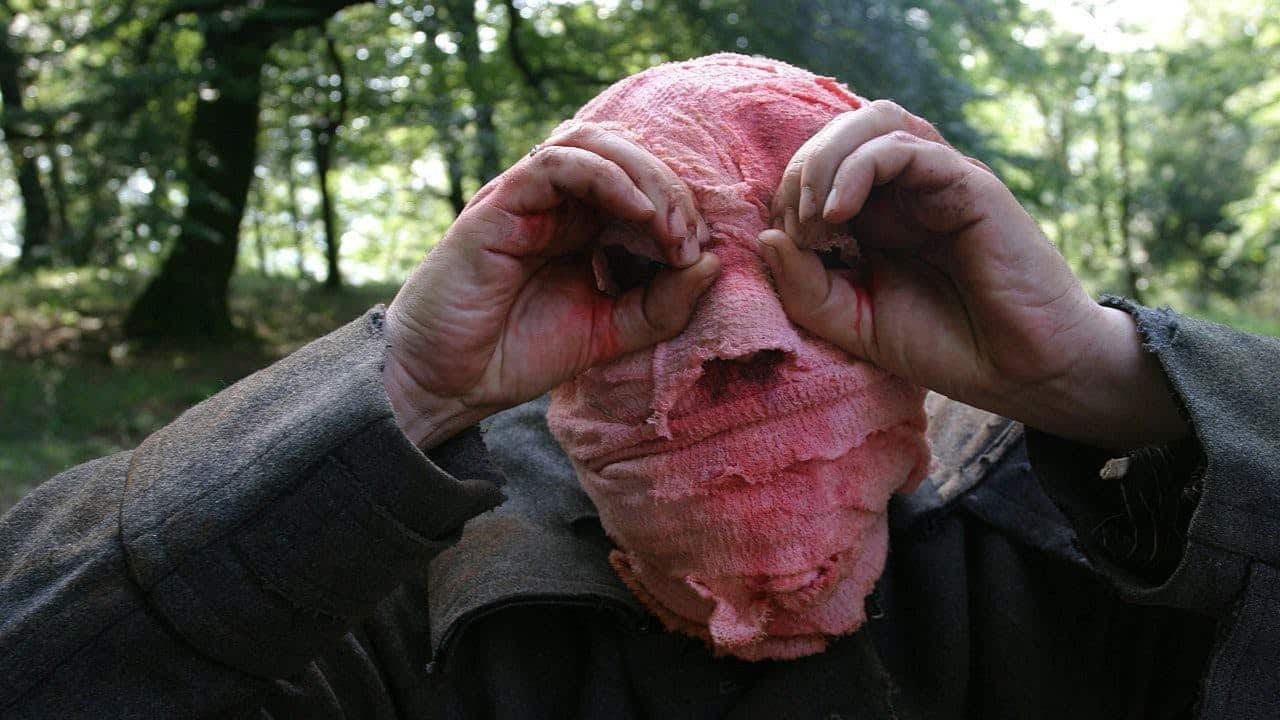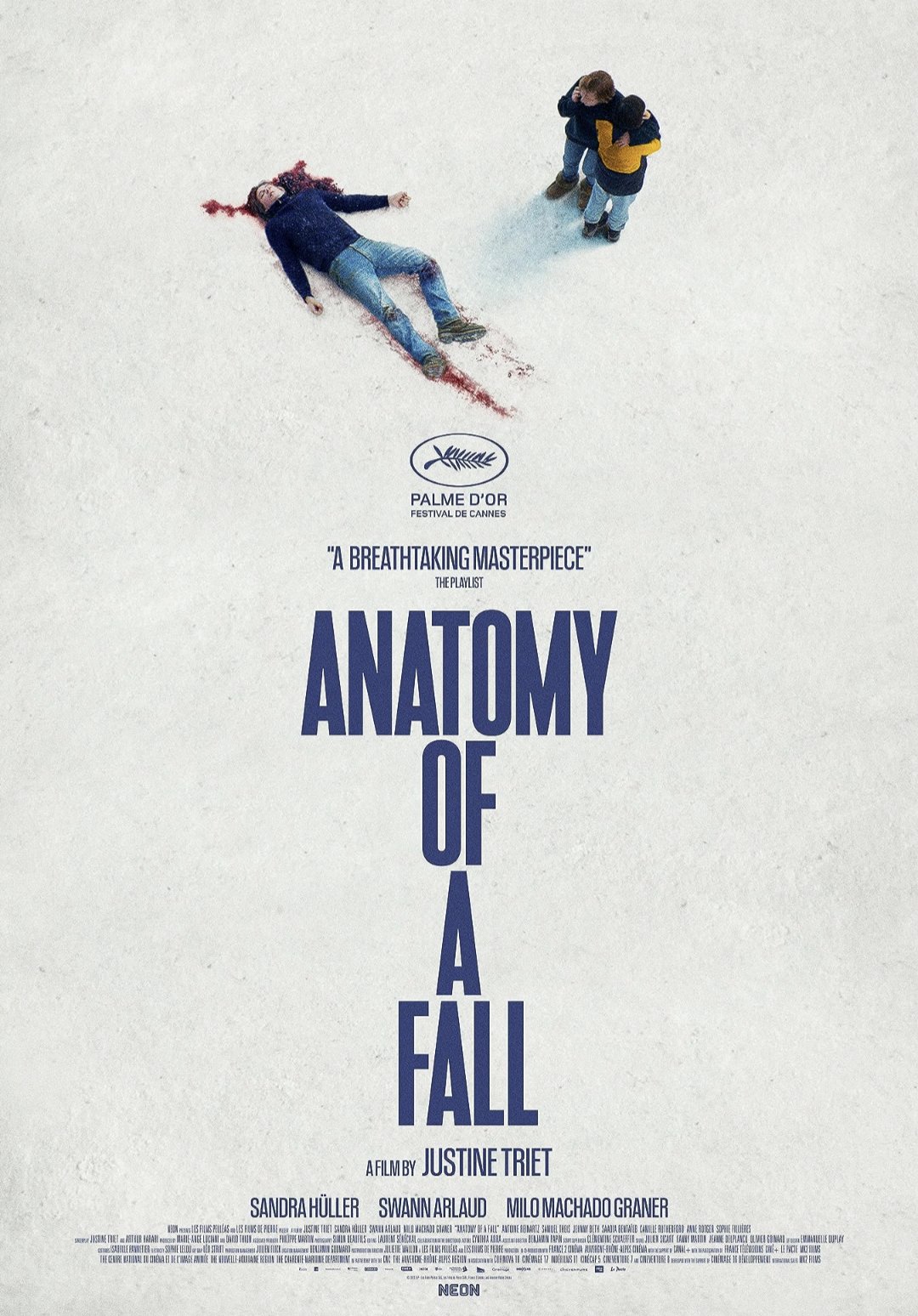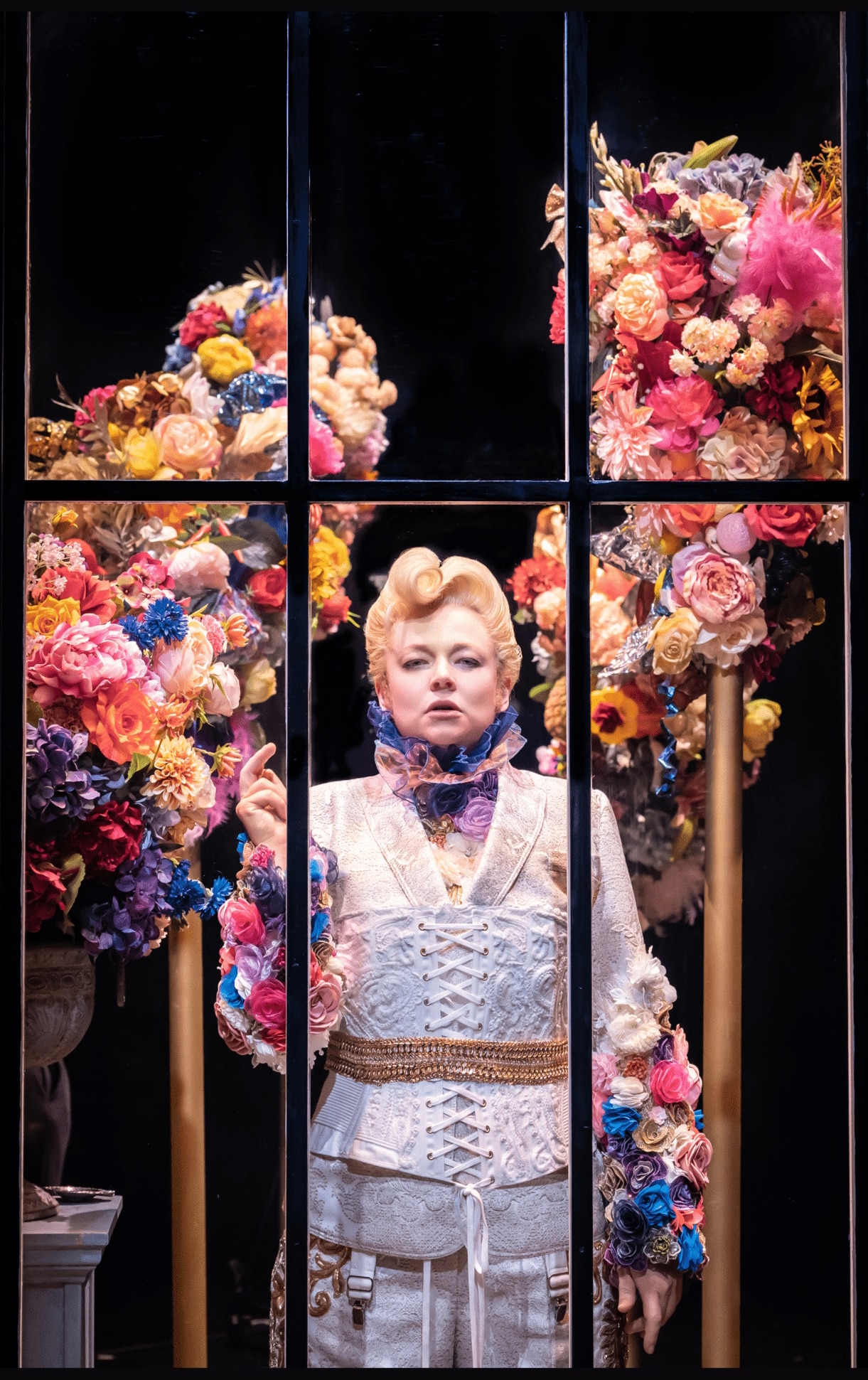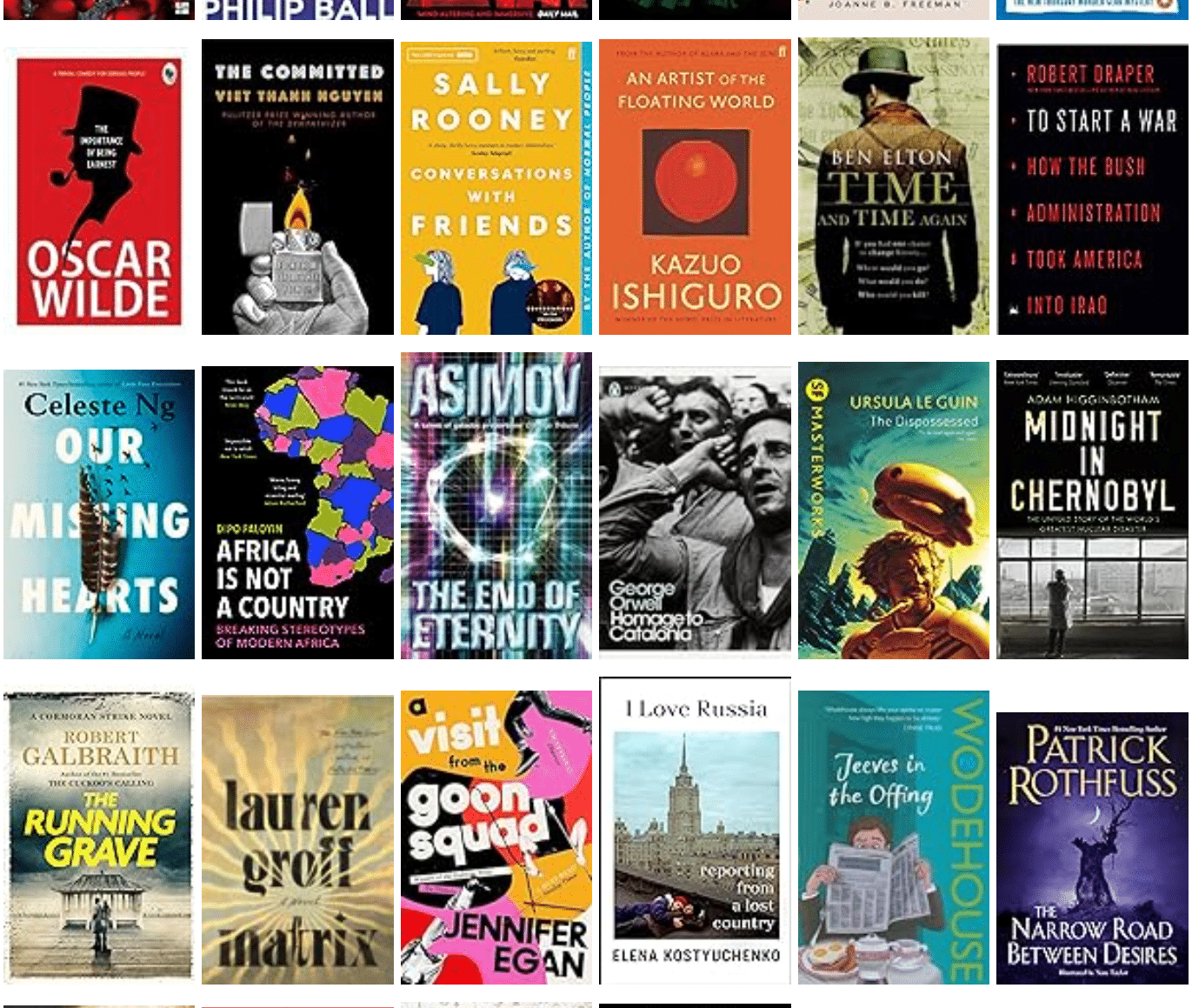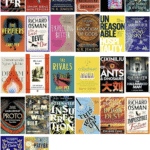Like the stock market bubble, the expected implosion of my reading total was staved off this year. In fact, I managed 26 books in total, which is four more than last year! For this I have to credit both our holiday in China and a golden two-week paternity leave which involved a lot of ‘sitting on the sofa next to a sleeping baby’ time. Since neither of these factors will recur next year, I’m still expecting my reading to drop off a cliff for 2026.
Oh, and on a non-book note, this year I also experimented with reading on a new Kobo Libra, rather than my Kindle, in addition to physical books. It’s really nice to have colour covers on an e-reader, even at the cost of some black-and-white crispness, and for some reason Amazon have decided they can’t be bothered to make a device with physical page turn buttons anymore. Also, it’s reassuring to confirm that my reading library works seamlessly between devices, rather than being tethered to one company. So, I’ve been very happy with that change too, even though the truly ‘perfect’ e-reader has still yet to be made.
Fiction
I kicked off the year with Tade Thompson’s Rosewater, followed later in the year by its sequel The Rosewater Insurrection. Set in the 2050s, this trilogy belongs firmly to the ‘alien invasion’ sci-fi subgenre and is centred around a giant, mysterious biodome which emerges suddenly in the Nigerian town of Rosewater. Thanks to the dome’s miraculous healing powers, Rosewater quickly becomes a major site of pilgrimage and begins to assert its independence from Nigeria itself.
In Rosewater, the creeping sense that humanity has already lost to the aliens from the very beginning, despite the invasion’s slow build-up, had strong echoes of The Three-Body Problem, although the style is very different. In the second book, the focus shifts to the mayor’s attempt to formally declare independence from Nigeria. Can the citizens of Rosewater broker a mutually beneficial compromise with the malevolent alien Wormwood against their common enemies? Overall, this was a good first choice for the year, and I’m looking forward to concluding the trilogy in 2026!
Speaking of Cixin Liu, I also really enjoyed Of Ants and Dinosaurs, a short little fable which I borrowed from Katie and read in a few sittings. It’s a wry parable of Cold War-esque paranoia and the terrible logic of mutually assured destruction, with ants and dinosaurs alternating between beneficial collaboration and fierce confrontation. As always with Liu, you also get the sense that he just really, really enjoys figuring out the intricate military details of how exactly the armies of ants are able to wage their wars on dinosaurs, and vice versa. And to be fair, these little details make for a very fun read. Highly recommended!
A series I completed in 2025 was NK Jemisin’s Inheritance Trilogy, completing both The Broken Kingdoms and The Kingdom of Gods. (Yes, if it wasn’t obvious, many of my reading choices this year were made because I wanted to tie up loose ends before having a child!) Overall, I still didn’t love this series, and although the second book showed signs of improvement, these fell away again in the last one. Perhaps the central problem is that having ‘gods’ as protagonists just doesn’t work for me, for reasons not unrelated to why ‘gods’ don’t work for me as a general concept. It feels as if there are no rules, and so nothing really makes sense, because although the gods have Aristotelian ‘purposes’ (which is dumb) there’s no real drama or tension.
It figures, then, that The Broken Kingdoms stood out from the pack for being written from the perspective of a human (a woman named Oree, who is blind but has the ability to see magic) and was about her relationship with ‘Shiny’, i.e. the sun god Itempas made mortal. I also remember my favourite scenes were the ones in which the true terror of Nahadoth, the god of darkness, was made clear. But overall I’m relieved to be done with this trilogy so that I can move on to fresh NK Jemisin worlds.
I hate to say this, but I also have some disappointment around Philip Pullman’s The Rose Field, the concluding part of ‘The Book of Dust’ series which extends the ‘His Dark Materials’ trilogy which I grew up loving. Don’t get me wrong, it’s a major improvement on 2019’s The Secret Commonwealth. We finally get the brave, adventurous Lyra back after the unhappy breakdown of her relationship with Pan, which never really made any sense. And it’s certainly a rollicking journey to the mysterious ‘red building’ in the Karamakan desert, far to the east. A particularly wonderful highlight of the book is Lyra’s encounter with Mustafa Bey – a Turkish merchant whose trading empire stretches far along the Silk Road – in a café in Aleppo. It’s just beautifully written.
Overall, though, the issue is that once Lyra finally reaches her destination there are just so many questions left unanswered. A nicer way of saying this, to borrow from Reddit, is that the ending is “quiet”, which is true. And of course, I wouldn’t expect – or hope – for everything to be wrapped up with a bow. But everything from Lyra’s relationship with Malcolm (heavily built up, then suddenly tossed aside) to fundamental bedrock questions of the series (are the gaps between worlds a mortal danger to us, worthy of great sacrifice to close, or actually… good?) are just kinda left hanging in the air.
At my grandmother’s funeral this month, to illustrate the idea of an eternal afterlife, the vicar used the image of an author writing a book, of which only a single copy is produced and later destroyed. While the particular book is gone, the story is “not really lost” because it emerged from the mind of its author, and so could do so again. And so it is between humans and god. (“It’s not a perfect analogy.”) The obvious, gaping fallacy here, of course, is that an author obviously couldn’t write the same book again, because any work of art is not the product of a static, unchanging mind but a very particular result of particular conditions at one moment in time.
Pullman, naturally, would see right through this shallow theology. But I bring it up because it reminded me of the relationship between his two series. They may share the same author’s name on the cover. But the sparkling magic of ‘His Dark Materials’ can’t simply be reignited decades later, even if its slow-burning afterglow remains a very warm and happy place to be.
Another series which I managed to finish this year was Hilary Mantel’s Cromwell trilogy, which concludes with The Mirror & the Light. This series hasn’t always been an easy read, but I’ve definitely enjoyed each book more than the last. There’s an especially chilling moment in this one – about a third of the way in – when a false rumour spreads about Cromwell’s plan to marry the King’s daughter Mary, and you suddenly start to sense the wheel of fortune turn for this masterful operator. Later, when the King admits to Cromwell that he no longer finds him surprising, and misses Cardinal Wolsey, you feel the floor fall away beneath him. The end comes not long after, accelerated by a disastrous marriage to Anne of Cleves and foreign interests plotting to undermine England’s great politician. (Special thanks to the Redditors who posted their chapter-by-chapter analyses in readalong threads – this made the book much more rewarding to read!)
The Underground Railroad had sat on my to-read list for a long time, and ultimately proved both very easy and very difficult to get through. The prose is nimble and light, but the underlying subject matter – escaping plantation slavery in the American South – is always horrifying. For obvious reasons, I did love the central image of a literal underground railroad, which (smartly) only appears at fleeting moments in the book.
I loved The Candy House, Jennifer Egan’s sequel to A Visit from the Goon Squad. It’s written in the same short-story style, but this time set a little in the future and featuring many of the children of the original cast of characters. I just wish I had a better memory for it all. Honestly, I struggled to keep straight in my head all the interlinked plots and characters from this book while I was reading it, let alone remember how they all fit together with the original. Thankfully, somebody has made a useful character map (here’s a mirror for UK readers) but what I really need is a big visual guide to the two books combined!
Any new Chimamanda Ngozi Adichie novel is something to treasure, so I was very excited when Dream Count came out this year. In the past I’ve always preferred her books set in Nigeria to the US, but this one splits the difference as it moves between the perspectives of four women – Chiamaka, Zikora, Omelogor and Kadiatou – and between Nigeria, the US and rural Guinea. The writing is always superb, and can’t fail to draw you in. It’s the most heartbreaking moments which stuck with me: Zikora’s abandonment during her pregnancy, the diminishment of the bold and brash Omelogor in America’s smug academic culture, and the awful trauma suffered by Kadiatou. But there are a lot of lighter parts, too. Strongly recommended, as always.
The Hallmarked Man was the latest entry in the Cormoran Strike series, and I thought it was a good one! The core plot was maybe not as innovative as the previous two books, but its resolution felt much more satisfying and cohesive, which is a major improvement. More importantly, absolutely nobody is still reading these books for the murders anyway: it’s all about Robin and Strike, and the writing is even more explicitly structured around this now.
Strike definitely comes across as a total dick: constantly scheming to separate Robin from her perfectly lovely boyfriend Ryan. I did feel it was a bit of a cheap plot device to have Ryan (a recovering alcoholic) relapse, since it then softens the more interesting dilemma of whether Robin should stay with him or not. But hey, we finally get a finale with the big confrontation we’ve all been waiting for, and I loved the surprise (but very amusing) role for Pat at the very end.
More entries in continuing series included Stone & Sky, the latest ‘Rivers of London’ installment, or “the one with the mermaid”! Set in Aberdeen, I enjoyed the alternating narrations between Peter and Abigail, although at this point I feel like Abigail comes across as the stronger character. Meanwhile, down at Coopers Chase, I read both The Last Devil to Die and The Impossible Fortune. The emotional core of the former book is Stephen’s deepening dementia, while in the latter Elizabeth is starting to put her life together again. This storyline really helped to soften the most annoying drawback of the series for me, i.e. the glib entitlement of the retirees. Relatedly, Joanna is now my absolute favourite character for finally standing up to Elizabeth. (Oh, and Ron’s grandson Kendrick’s crush on Tia is absolutely adorable.)
You can tell that Arthur Conan Doyle had realised that his usual Sherlock Holmes formula had pretty much been exhausted by the time of His Last Bow, because some of the stories in this collection are pleasingly experimental, such as the expanded role for Mycroft Holmes in ‘The Adventure of the Bruce-Partington Plans’. My favourite was ‘The Adventure of the Red Circle’ because reading it aloud (a staple Domdi evening activity) provided the opportunity for lots of silly accents. Most unusual is the final story, ‘His Last Bow’. Written in 1917, this is an amusing reunion of an ageing Holmes and Watson to foil a German spy. There’s no detective mystery to unravel at all here, it’s just a patriotic contribution to the war effort!
The Wood at Midwinter is a very, very short Christmas story about a saint who wishes for a child and adopts a bear cub. Appropriately, I read it on Christmas Eve. Meanwhile, A Psalm for the Wild-Built and A Prayer for the Crown-Shy is a pair of utopian sci-fi books (the ‘Monk & Robot’ series) from Becky Chambers. It’s set in a post-robot uprising world in which humans have learned to live harmoniously within their natural limits, while the robots originally built for humanity’s factories have retreated into the wild.
A Psalm for the Wild-Built was the first thing I read after our son was born, because I thought I owed him something optimistic for the future. It’s an odd little book. I don’t share the innate pastoralism, but the pairing of Dex (a “tea monk” who travels between villages, making tea and listening to people’s troubles) with Mosscap (a robot who emerges out of the wilderness to check on how humanity has progressed) is really lovely, and clearly a spiritual descendant of Asimov’s Elijah Baley and R. Daneel Olivaw. If I was being critical, I’d say that Ursula Le Guin was much more honest than Chambers about the level of coercion required to make any social system work, even the ones which might seem very attractive.
By a process of elimination, I think I’ve now arrived at my truly favourite reads for 2025: Jane Pek’s The Verifiers and its sequel The Rivals. Huge thanks to Toggolyn for gifting the first one to Randi, which I subsequently borrowed! These books are fun, page-turning thrillers following the life of Claudia Yin, a young New Yorker who loves detective fiction and cycling in inappropriate weather. She joins Veracity, a secretive agency which investigates dodgy online dating profiles on behalf of its clients, and quickly gets drawn into the murky, murderous underbelly of the online matchmaking companies.
The second book loses a point for ending so abruptly on a giant cliffhanger, and in general the biggest weakness of the series is the sheer technical unbelievability of Veracity’s hacking abilities. On the other hand, there’s no need to stop and think about that for too long, thanks partly to the intricate mysteries themselves but also the stresses and strains of Chinese-American immigrant family life. In particular, Claudia’s relationship with her (very tough) mother is a central foundation to the series. But perhaps the best part about the whole thing is Claudia’s love for Inspector Yuan: a fictional detective who, in-universe, is the star of a long-running series set during the Ming Dynasty. I would absolutely read these next if I could, at least while waiting for the third Claudia Lin adventure.
Non-Fiction
Simon Sebag Montefiore has an odd writing style. I wasn’t especially seeking him out, but I was looking for a biography of Stalin and this was well-reviewed, which is how I came to read Stalin: The Court of the Red Tsar this year. (Technically this is a follow-up to Young Stalin, but given that there’s a limit to how much Stalin I actually want to consume, it seemed best to prioritise his ruling period.) What initially threw me, although I did eventually get used to it, is that each chapter felt like reading raw writing notes, complete with all the relevant quotes. I was expecting more of a narrative!
That said, by the end I had a clear sense of how the small, petty corruptions of leadership were magnified to such horrific extremes in Stalin’s court. We’re all familiar with the dilemmas: not wanting to contradict the boss, but also not wanting to seem sycophantic. At root these same instincts also underpinned Stalin’s rule, but led to constant, bloody purges rather than poor business decisions or a losing election campaign.
I read and listen to so much about the crumbling of liberal democracy these days, but all political systems have their own weaknesses, and ultimately the cult of personality is not a durable institution. So, in a strange way, this book left me hopeful.
For obvious reasons, Randi and I both read Emily Oster’s data-driven guide to pregnancy Expecting Better this year, plus her follow-up Cribsheet which covers the early years of parenting. These came highly recommended, although Oster is American and so some of the advice isn’t particularly relevant for British parents.
Expecting Better is the better book, and overall very useful. From memory, the most helpful sections were on miscarriage rates by number of weeks (always good to have the raw numbers) and a clear explanation for why certain foods should be avoided, because it’s helpful to actually understand the mechanism in order to properly judge the risk. (For the record, things like mercury and alcohol are actively bad above a certain quantity, whereas the danger from foods such as sushi is purely the risk of food poisoning.)
I found Cribsheet much less helpful. Partly, this is because while we all largely agree on the outcomes we want from pregnancy, raising a child is obviously deeply personal and depends on the individual parents. The empirical outcomes are much harder to measure anyway, which is why so many of the chapters conclude in a vague, open-ended way. But also, Oster is clearly a naturally anxious person, so a lot of the book is just her talking herself into being more relaxed. That’s good for her, but thankfully this isn’t a problem we currently have, and fingers crossed it’s something we can avoid…!
Unreasonable Hospitality was a gift from the nice people at Booking.com, and I don’t have much to say about it other than some stories were clearly lifted directly into The Bear! This Way Up: When Maps Go Wrong was a gift from me to myself, and an absolute delight. Randi and I have been big fans of Jay Foreman and Mark Cooper-Jones’s Map Men series from the very beginning. We’ve even got a Map Men mug! Happily, this book perfectly captures their blend of self-aware humour and, well, super interesting facts about maps. The whole thing is great, but I think my favourite chapter was the one on Google Maps, and the difficulties they faced when expanding to India. (Did you know that 60% of Indian streets don’t have street names? Neither did Google…)
Finally, on a bit of a whim, this year I read Laura Spinney’s Proto: How One Ancient Language Went Global. This traces the astonishing spread and development of Proto-Indo-European, the singular ‘ancestor’ language to many modern tongues as diverse as English to Gujarati. I definitely won’t pretend to have taken everything in, but it’s very rare for me to read any history which stretches so far back, and so a little mind-blowing to think about modern humans migrating and communicating long, long before any of our ‘historical’ categories of peoples existed.
It’s a good reminder of how impermanent these constructs really are. I also appreciated Spinney’s reminder that it was only 18th century European nation-state building projects which established the idea that monolingualism was the ‘normal’ state of affairs for a country, and that much of the world just doesn’t work this way. (See also “different places are genuinely different” from This Way Up, as above.)
Since I’m not a linguist, I do struggle to spot the difference between ‘these words are clearly connected’ vs. ‘these words are totally unrelated’ just by looking at mysterious IPA symbols. I was also deeply curious about why it’s worth writing a book about Proto-Indo-European but not its ultimate Proto-Human ancestor. This is briefly discussed but then set aside in the intro, but I was interested to learn more. Is it just impossible to say very much? Why can’t we use the same techniques to extend the ‘family tree’ of languages further back? (I’m sure there are plenty of good answers to these questions… they’re just the ones which occurred to me at the time.)
I’ll leave you with my favourite language fact from Proto: the origin of the English word ‘merry’ (as in, Merry Christmas!) evolved from meaning ‘short’. In other words, people were cheerful when their religious ceremonies didn’t drag on for too long…😉
I have mixed feelings about my reading this year. On the one hand, I only managed 22 books, which is very few. Part of this is just down to our travelling patterns: mostly short weekend breaks, and no long holidays affording lots of precious reading time. On the other hand, when I did find time I’m pretty pleased with my selection. It was a good range, with lots of highlights, a nice mix between old and new, and plenty to recommend to others. So, here’s to another year of books!
Fiction
I loved The Fraud, my first book of 2024, not least because Zadie Smith has returned to writing about London rather than New York. Gloriously, even in this nineteenth century historical novel she manages to include the fields, farmers and ‘grassy Willesden Lane’ of Kilburn, Kensal Rise and that patch of North West London where we both grew up. I even loved the book itself: a signed, chunky hardback in a gorgeous cover and enigmatic black-edged pages.
Contained within those pages is a story based on the real-life Tichborne case, a fascinating example of Victorian populism in which a working-class man, and obvious fraudster, claimed to be the long-lost heir to a wealthy family fortune. Despite being convicted of perjury – or, rather, thanks to the widespread coverage of his trial – he received enormous public support, symbolising the empty claims of the justice system when the interests of the rich and powerful were challenged. Of course, the central conundrum is that if he really had been the missing heir he wouldn’t have been ‘a man of the people’ at all. So his folk hero status actually relies on the fact that, at some level, people must know that he’s lying to them, while still acting as a tribune for public anger and disaffection. The political parallels for our era are obvious, but this isn’t a preachy book, just an invitation to think deeply about what it means to be a fraud.
I also really, really enjoyed reading The Night Circus, by Erin Morgenstern, although I have no memory of how it ended up on my to-read list so I’m not sure who to thank. This is a dazzling fantasy about a magical travelling circus, which serves as the stage for a sinister contest between two young magicians who have not chosen to play and do not know each other’s identity. The only thing I wasn’t totally spellbound by was the romance at the centre of the plot, but then again, perhaps a romance isn’t always supposed to make sense. Regardless, this is highly recommended, and images of the night circus have lingered in my brain long after reading.
Sticking with fantasy, this year I also started NK Jemisin’s Inheritance trilogy with The Hundred Thousand Kingdoms, and my reaction was a resounding hmmmm. This was Jemisin’s debut novel and it very much reads like a rougher, first-draft version of her later The Broken Earth series, which I adored. A lot of the same ideas are there but it just coheres less well together, with certain elements – such as the love between Yeine and Nadahoth – happening too quickly. Yeine is meant to be investigating her mother’s murder, but the tension isn’t high enough because for most of the book she’s just waiting to die. With all that said, I’m still excited to keep going with the series, and perhaps my only real problem was reading Jemisin’s perfected version first.
I also did not love Ottessa Moshfegh’s Eileen. Dare I say it, but I think it was just too dark for me; or rather, too claustrophobic, with a very slow build up to a grotesque climax. It’s usually very annoying when a reviewer complains about “unlikeable” characters – it’s a book, not a date – but this really is the ultimate test of a novel constructed entirely of deeply, deeply unlikeable characters. Reader: this makes me feel old, but I failed the test. You may have better luck.
Talking of books being ‘too dark’: for years I’ve wanted to read a Stephen King novel. Since I’m really not a horror person, I picked 11/22/63 way back in 2017 as a nice time-travelling historical compromise, and this year I finally got around to reading it. Despite being long – really long – I did really get into this, even though the minutiae of Lee Harvey Oswald’s life never particularly grabbed me, and the central premise of the time traveller’s escapade – that preventing the assassination of JFK would lead to a transformationally better America – is so obviously ridiculous. Perhaps if Jake Epping had been a high-school history teacher, rather than a high-school English teacher, he would have figured this out sooner. Still, it was a lot of fun to read (barring the odd descent into overly-graphic violence) although coincidentally Trump narrowly escaped an assassination attempt while I was midway through, which was very weird.
Continuing some series from previous years – The Bullet That Missed was my favourite entry in Richard Osman’s Thursday Murder Club mysteries to date, and I (mostly) enjoyed the characters much more than I normally do. The plot was also the right balance of ‘clever, but not so clever that I couldn’t follow the ending’. Meanwhile, in Maya Angelou’s autobiographical series, I’ve reached book four – The Heart of a Woman – and my main takeaway is that her relationships are always so terrible!
Ben Aaronovitch’s latest Rivers of London novella, The Masquerades of Spring, was a lot of fun. Set in 1920s New York City (but not in an objectionable Zadie Smith way), the main character – Augustus Berrycloth-Young – is an entirely undisguised Bertie Wooster clone, so much so that it feels like an official crossover. And who wouldn’t want to read Augustus/Bertie bumbling around with Nightingale whilst investigating a haunted saxophone?
Over in rather more weighty universe, this year I also read the second book of Hilary Mantel’s Cromwellian epic, Bring up the Bodies, and the good news is that the sequel fixes her annoying writing habit from the first book of making it really ambiguous who is speaking half the time. Overall, I think I enjoyed this more than the first, helped by a tighter focus on a singular event. This novel is squarely about the downfall of Anne Boleyn, and while obviously her execution for adultery is horrific by modern standards regardless of what she did or didn’t do, all of the intrigue and plotting leaves me very curious about whether any of the confessions from her lovers – extracted under torture – contained any kernel of truth at all. A master study in the orchestrated downfall of someone who once seemed so powerful.
Stuart Turton’s The Last Murder at the End of the World is still not as good as his debut – The Seven Deaths of Evelyn Hardcastle – but Emory is such a great hero to root for that I still kinda loved it. It also helped that the island setting was so vivid and evocative to me. It reminded me of that time in primary school when you have to draw a map of an island with coordinates, and I loved the idea of a single place with all of the world’s natural features – mountains! volcanoes! jungles! quicksand! – all crammed together. Anyway, this story is about the curious, inquisitive villager Emory trying to solve a murder in a post-apocalyptic world where everyone’s memories have been wiped. There’s also an omnipresent AI narrator, Abi, a countdown to humanity’s extinction thanks to a deadly advancing fog, and so many twists and turns that I would have to re-read the book to remember everything properly. But I can think of worse things to do…
I wish I had a better memory for plots in general, because then I would have enjoyed linking up the characters from Emily St John Mandel’s The Glass Hotel with its sorta sequel, Sea of Tranquility, which I accidentally read first in 2022. As it is, I still really enjoyed this novel about half-siblings Paul and Vincent, whose lives briefly converge while working at a hotel on Vancouver Island in Canada. Mostly, however, their stories are separate but intertwined, as Paul is forever haunted by a terrible incident from his student days and Vincent becomes a trophy ‘wife'(ish) to a Bernie Madoff-esque character who is running a giant Ponzi scheme. To be honest, I’m always nervous writing about Emily St John Mandel books, because I fear Todd will come running to ask what it was “really about”. I don’t know exactly, Todd, but I’m still down for another one.
I have so much to say about Naomi Novik’s Uprooted. This is partly just because I read it shortly after Randi, so we could actually discuss it while it was still fresh in our minds. But I was also struck by a well-written review on Goodreads by someone who absolutely loathed it thanks to the ‘abusive’ relationship between the ‘Dragon’ – a cold, seemingly ageless wizard who guards over the local village from his tower – and seventeen year old Agnieszka, the latest in a long line of village girls who is selected by the Dragon to live with him in the tower for ten years. Of course, in an obvious sense, the reviewer is clearly right, and I respect anyone who decides this book just isn’t for them. But fundamentally, the most magical thing about Novik – just as with Spinning Silver – is her ability to draw you in to a completely different, much more feudal mindset of interlinking rights and obligations which is utterly alien to how a modern character would experience the world.
If you can embrace this, then Uprooted is a gripping story about the development of Agnieszka’s own magic and the terrifying menace of the Wood. I loved the descriptions of magic being performed – the best I’ve ever read – and although the contrast between the Dragon and Agnieszka shades a little close to the ‘women are more natural and intuitive’ trope, Novik avoids making anything too one-sided. My main criticisms of the book are two-fold. Firstly, I did not buy Agnieszka’s friend Kaisa as a character. She seemed surprisingly underdeveloped compared to everyone else, and seemed to exist solely so that Agnieszka could be protective of her. Secondly, the magic system itself was too vague for me, so it was never quite clear why some things were possible and others were not. I also feel that the ‘corruption’ of the Wood could have been pushed even further. But these niggles just illustrate how strongly Novik’s writing implants itself in my head. Highly recommended if you enjoyed Spinning Silver (looking at you, Reema).
This year I’m also proud of myself for finally reading The Odyssey. And by gigantuan good fortune, I wasn’t far along before Randi and I happened to stay with a bone fide classicist over the weekend, so all I had to do to get answers to my dumb questions was look up from the sofa and ask. To be fair Emily Wilson’s translation (which we may affectionately term the ‘woke translation’ for its emphasis on slavery) is superb for rendering Odysseus’s adventures in crystal clear English. What really surprised me is how early his voyage concludes; Odysseus is back home long before the final verse, and after that his lengthy, drawn-out sequence of elaborate disguises and endless loyalty tests – before, spoiler alert, he murders all his mother’s suitors in a massive bloodbath – is less engaging. Well, less engaging to me. I don’t think anyone is reading this blog for an original take on Homer. Although, personally, my gut feeling is that since Odysseus is continually shown to lie about everything – to everyone! – that actually all of his stories are made up.
I’m still working my way through Sherlock Holmes – in a process which has been ongoing since 2010! – and this year I reached Doyle’s fourth and final novel, The Valley of Fear. This was a good one, actually, with its sinister second half about a murderous Freemason gang set in 1870s Pennsylvania. Even more fun was Eric Ambler’s Uncommon Danger, which is like all other Eric Ambler thrillers (amateur hero becomes embroiled in international intrigue) but is a particularly good specimen of the genre. Set in 1930s Austria and Czechoslovakia – including some genuinely tense nighttime border scenes – the indebted freelance journalist Kenton comes into possession of some incriminating Russian documents before alternating between capture (boo) and escape (phew). You’ll wish you were on the run, too!
Finally for fiction this year, I read my uncle’s second novel: The Bard’s Trail! This is quite different to his first one – a fast-paced political thriller featuring murder on a plane (which I read on a plane), competing spy agencies, international terrorist plots and (unsurprisingly) an excuse to feature a Champion’s League final match. I really enjoyed this, although I miss being able to pull my usual trick when reading thrillers: a reference plot summary from Wikipedia on hand to keep all of the characters and plot strands straight in my head. But it was a fun way to close out the year!
Non-Fiction
OK, so I’ve owned a copy of The Writers Tale for a very long time – ever since Russell T Davies autographed it for me and my sisters when it was first published. But I hadn’t sat down and read it cover-to-cover until this year, with all of my renewed excitement about Russell’s return to lead Doctor Who. And it’s a fascinating text. Davies is so unflinchingly honest – at times, you can just imagine an editor emailing to check “do you really want to put this in print?” – but I’m left with even more appreciation for the man who saved my favourite show.
It’s very rare for me to read any books in the work-related realm, but I couldn’t resist Steven Sinofsky’s Hardcore Software, which is really just a compilation from years of his Substack posts. (As a result it’s overlong and would have benefited greatly from editing – but this seems to be a signature Sinofsky trait. He’s always writing memos!) Sinofsky had a long career at Microsoft in product management, climbing the ladder to lead the development first of Office and then Windows, and I’m really 90% here for nostalgia for the era when these products were exciting and “releases” meant something. For the days when my dad would buy a new computer, and it would come with Windows 98 rather than Windows 95, and there were new and shiny things it could do. That said, even though the context of my job is very different, it’s also fun to be able to empathise with challenges and dilemmas which are universal to building any software product.
I’ve wanted to read High Risers for a long time. Published in 2018, it’s a book about one of Chicago’s most famous public housing projects: Cabrini-Green, home to somewhere between 15-20,000 people at its peak in the 1960s. The thing which makes this different to the other books about Chicago that I’ve read (Gang Leader for a Day, There Are No Children Here) is that Cabrini-Green wasn’t “over there” on the South Side, it was “right here” where I used to live and work in Chicago, and not very long ago at all. I mean, I literally shopped in the Target which was built over one of the demolition sites. So I’m implicated, in a sense, as the type of person who was “made room for” when these buildings were torn down and its residents were displaced.
And yet… the book is clearly not written as a simple elegy for these large housing blocks. I don’t know how anyone could do that in good conscience about a place where, by the end, children were in such danger from stray bullets. One of the uncomfortable truths which comes up again and again in these books is that in the heady early days – when the homes were fresh and new, when the political atmosphere was optimistic, when new residents were excited to escape abusive landlords – the authorities exercised a high degree of selection about exactly which families were allowed to move in. So while the initial community may be poor relative to the general population, it still benefits from not being the “housing of last resort” that it later becomes. One of the most hopeful parts of the book is a brief period when residents of individual buildings are allowed to take control of their own blocks and self-organise: an experiment which is sadly cut short by demolition. But it could have been a more sustainable model.
David Runciman’s The History of Ideas was an easy read because it’s just a written version of the second series of his ‘History of Ideas’ podcast, which I’d already enjoyed and recommend to anyone who is interested in political thought. Conversely, I’d never listened to Andrew Copson’s What I Believe podcast, but given that he was hosting me it felt rude not to pre-order his new book. This is an engaging series of discussions with prominent humanists about their philosophies on life: a quick read, and a nice tour through a lot of very reasonable people’s heads. My favourites were Nichola Raihani on cooperation (because I’d already heard about some of the research here about why different cultures have different attitudes about loyalty to kin, and it’s fascinating) and Ian McEwan on the novel being a “fundamentally secular” form. “If you want literature to worship God, then poetry is, I think, the perfect form. Otherwise, the monograph or the prayer and the hymn. The novel is too pluralistic for religion, too tolerant. It is indeed the ultimate humanist form.” I don’t know whether this is true or not, but it does give me a nice excuse for my lack of poetry.
Finally, I also read Siddhartha Mukherjee’s The Song of the Cell. I’d still recommend The Emperor of All Maladies as his greatest work, but you’re always in good hands with Mukherjee to guide you through the wonders of human biology with a reassuring doctor’s touch. As always there are lots of interesting facts which I quickly forget, but the overall impression is of the incredible ecology of cells working together to form one person like you. We’re used to thinking of the heart as “a muscle which pumps blood around the body”, but how do individual cells possibly form a mechanical ‘pump’? How does the immune system differentiate between the self and the nonself? We’re so fortunate to live in a world which has made so much progress in understanding how this works, and with so many people dedicated to taking us further still. And to be able to curl up with a book which summarises the past century or two of these discoveries is its own special joy.
Fun fact: on 27th April, this blog turned 20 years old. It started on Blogger, which shockingly still exists, albeit presumably only because there’s still an active email thread bouncing around Google trying to figure out exactly which team owns it so that they can shut it down. April 2004 was only two months after Facebook launched (for Harvard students only), two years before Twitter and six years before Instagram. It was, in other words, before everything turned a bit rubbish, and my stubborn determination to keep this thing rolling forward has been a great insulator from social networks over the years. Even if it is just a very inefficient way of writing a diary. Onwards to the next 20 years!
Of course, in 2004 I was still in secondary school, and a few weeks back I got to nostalgically relive the secondary school experience by signing up for a project and then leaving all the work until the night before the deadline. This was part of a Sense About Science project to crowdsource ratings on the quality of government publications – which is about the coolest sentence I’ve ever written – and as a result I now have random nuggets of information in my head fighting to get out about both leasehold reform and Universal Credit’s Work Capacity Assessment. Fortunately neither of these topics came up when I had dinner with Andrew and Bonnie a few Fridays ago, but we did stay up so late discussing theological differences between Protestantism and Catholicism that I had to crash overnight in their spare room. (And yes, this is the kind of engaging content which has kept this blog going for so long. You’re welcome.)
Other highlights of April included being invited to Conor’s birthday party in Mayow Park – where I was delighted to discover that an updated version of Punch & Judy is still going strong – although this was also where I discovered that Randi and I have been pronouncing the name of Chandos pub totally wrong all of this time. (We still prefer our version, though, and are sticking to it.) I also finally got a chance to watch What We Left Behind, a really lovely retrospective on the making of Star Trek: Deep Space Nine in the 1990s. I loved watching this with my dad growing up, and it was his joint favourite Star Trek (along with The Next Generation) so it was a little sad to hear that the cast and crew always felt a little unloved and unappreciated compared to their sister shows. We loved you!
The really big thing last month, however, was Catherine & AJ’s long-awaited visit to the UK. Randi and I were both very excited to see them and took the week off work, starting in Edinburgh and then migrating down to London midway through their stay.
Well, I say “took the week off work” – this was mostly true, but Randi did force them to canvass with us in Bonnyrigg on Sunday afternoon before a very lovely Midlothian dinner with Kirsty and Roger in the evening. Through this process I discovered that having an adorable two-year old with you on the doorstep is a great way of melting the ice.


Other holiday meals in Scotland included the classic Dishoom dinner (where I bullied everyone into trying the Liberty Punch with me) and a trip to the excellent Makars Mash with Katie and James, which I am desperate to return to so that I can work through all of the mash potato varieties.
We also visited Edinburgh Castle (which I’ve done before) and the Botanic Garden (which I hadn’t – and it’s free!) in addition to lots of nice walks and – as you’d expect with a two-year old – sampling the quality of many different playgrounds. I also got in trouble for teaching the next generation how the on/off switches work on noisy Fisher Price toys. I regret nothing.



Wednesday’s train to London was significantly enhanced by loading up with a plentiful selection of wine and cheeses for the journey, so we were well-fed by the time we arrived back at our flat. Catherine and AJ had stayed with us back when we lived in Tulse Hill, but this was the first time they got to see our Forest Hill home in person and Randi and I had spent weeks strategising about how much of the local area we could plausibly show them over a few days. In the end we managed to pack in a fair amount! From morning cardamon buns on the High Road to the playground at the top of Blythe Hill, the Waterlink Way, the Horniman Museum and Gardens (including the aquarium and petting zoo!), the Crystal Palace dinosaurs and the Perry Hill pub, we covered a decent amount of our South East London slice.
We also had a two year old’s birthday to celebrate, for which we turned to the ultimate birthday destination of all time: the London Transport Museum! Having clamoured around the buses (she really liked the UK’s buses in general) we stocked up on gifts from the glorious shop, although TfL have not yet released official merchandise for the new London Overground line names so – clearly – I will be back.
That evening we also celebrated with a classic Colin the Caterpillar birthday cake, which went down well with everyone. Other meals in London included sharing every single vegetarian dish on the menu at Padella (no regrets) and an evening at the Mayflower pub before an evening walk along the river to Tower Bridge.
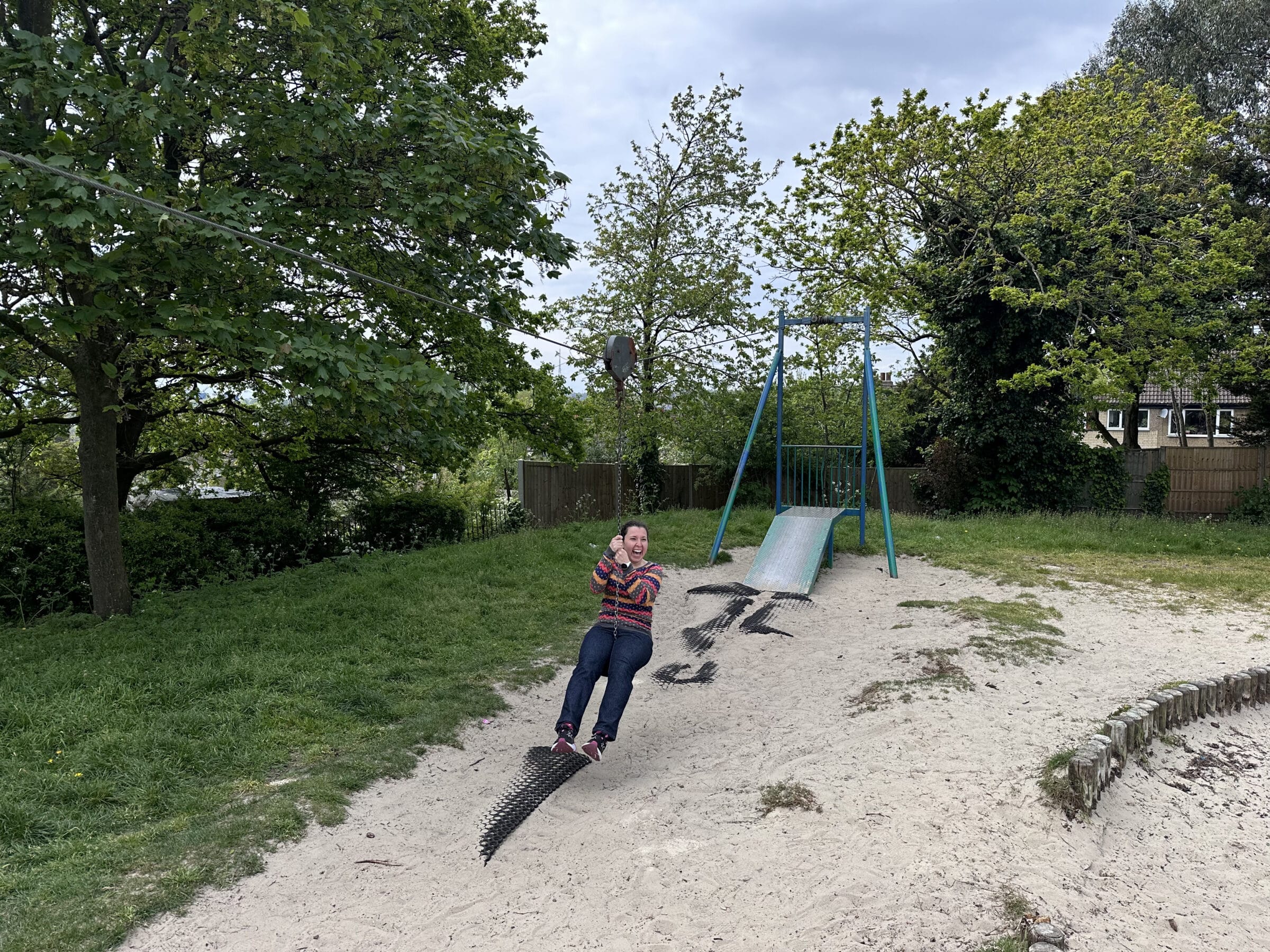


On Sunday, Catherine and AJ’s friend Mark had managed to get us all tickets to West Ham vs Liverpool, so we set off for Stratford for only my second in-person football match (PE excepted). On the plus side:
- The inherent pessimism of Forever Blowing Bubbles is genuinely charming.
- It was only £6.50 for a pint, which is much less than the outrageous markup I was expecting.
- The guy seated behind us offered an excellent running commentary – not only about the game, but also useful contextual information about West Ham’s woes (“moving to this soulless urban hellscape”, “not having anyone with strategy” etc.) and, as a bonus, the improvement in his previously fractured relationship with his father.
On the other hand, the atmosphere was more ‘weary resignation’ than full-blooded enthusiasm, which I guess is in keeping with the song. And it was a 2-2 draw, so the whole thing could have been written off from the start.
(Here ends Dominic’s match report.)
After the match we wandered down to Victoria Park, which surely must win the award for the most expensive and impressive children’s playground of the week. The next evening, on Catherine and AJ’s last night in London, we met up with Mark and other friends in a pub in Leytonstone: the good kind of pub, with space for kids to run around while the adults talked about football or (in my case) learnt super-interesting things on non-football topics like universities, organ donation and GP funding reform. (Still no opportunity to slip anything into conversation about leaseholders or Work Capacity Assessments, though.)
That’s probably enough incoherent rambling for now – I’d hate to get burnout and fail to deliver on my “another 20 years” promise. Although, in closing:
- We very much enjoyed watching the Science Fair documentary together, so thanks to Katie for the excellent recommendation!
- I was very much creeped out watching the BBC’s Why Planes Vanish: The Hunt for MH370 on my own.
- I am hugely relieved at Sadiq Khan’s re-election, and that my jitters about the polls were wrong. The fact remains – as both Catherine and AJ agreed – that Sadiq’s text layout choices in the London Elects candidate information booklet were… questionable. Call us next time. (Congrats also to Count Binface for defeating Britain First – this does make me proud.)
This month I’ve watched a bunch of interesting things, so this post is more like an old-school Abbi review blog:

Macbeth
Specifically, the production starring Ralph Fiennes and Indira Varma and staged in a great big warehouse in Canada Water. It’s very evocative. The set is scorched by a burning vehicle, assaulted by the sound of missiles and – at an appropriate moment – the walls are even soaked in blood.
What’s it about?
You probably know this one: Lord Macbeth, an 11th century Scottish general, learns from a trio of prophesying witches that he is destined to become King of Scotland. At the urging of his ruthless wife, he promptly kills the current King Duncan to speed things along, kicking off a bloody cycle of murder and madness.
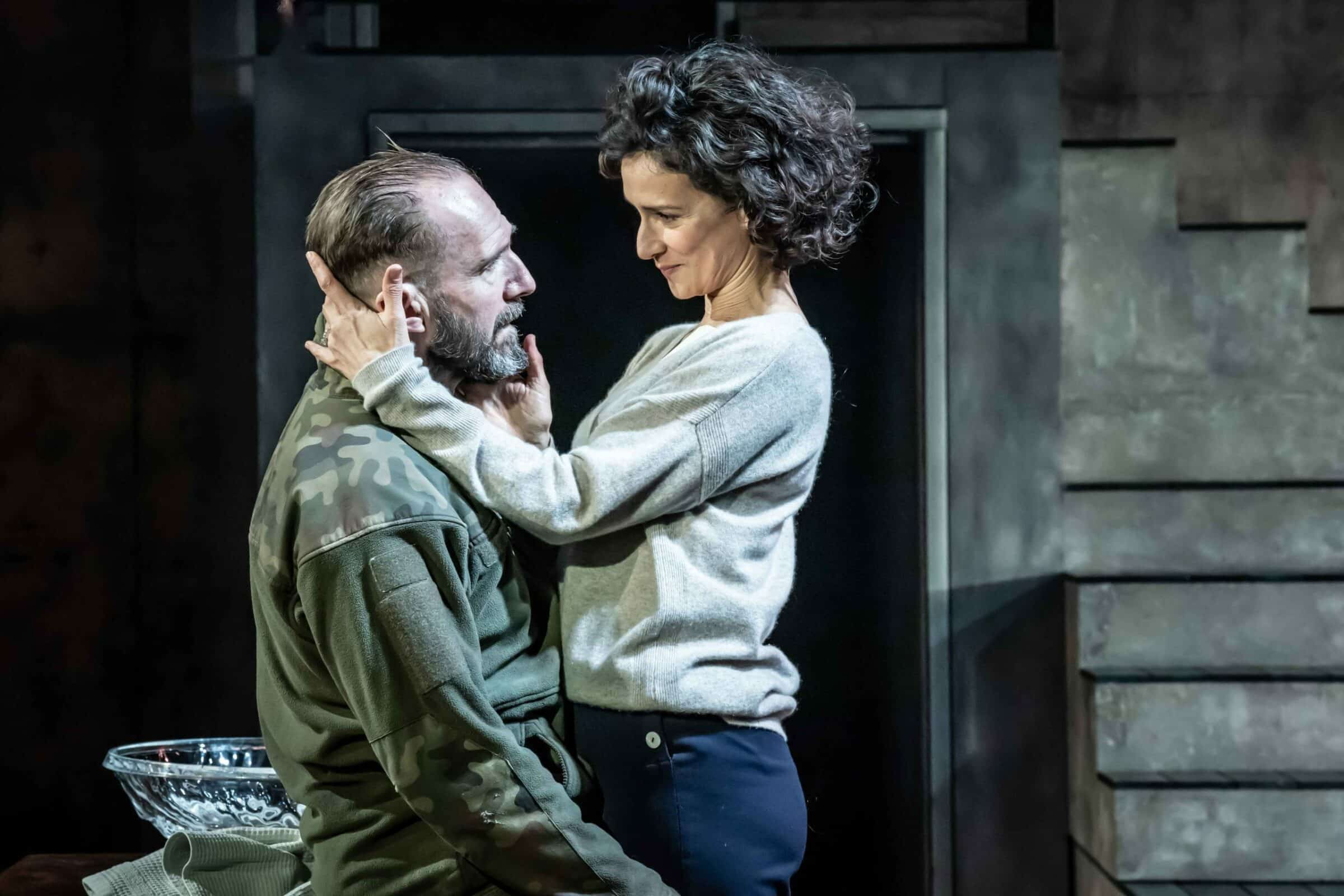
Idiocy analysis
I’m very fond of Macbeth as a play (thanks, multiple English teachers!) but Macbeth the character is unforgivably stupid. He should be the only character with an ironclad motive not to murder the King, given that he is the only person in the world with supernatural assurances that he will inherit the crown anyway(!) and everytime I watch him yield to Lady Macbeth’s emasculating schtick I am internally screaming for him to grow a brain and/or backbone and just calmly point this out to her. But no. Macbeth is the guy who sees the path of a wildfire inexorably approaching his house and rushes in with a can of petrol to try and commit insurance fraud.
Who did you see it with?
Kira, who suggested we get tickets last year! Hat-tip to Annie who recommended an excellent Mexican spot in Surrey Quays to grab beforehand.
Have you changed your mind about this play since childhood?
No. In fact, in school I wrote a defence lawyer’s speech on behalf of the three witches arguing that they “have not murdered, or even requested or suggested murder” but “simply predicted a chain of events which can be interpreted in many different ways”.
I added that it was “of course, regrettable, that Macbeth turned to murder” but noted that – in their second encounter, when Macbeth comes back to the witches looking for more predictions – “the witches had every right to mislead a murderer, if the intention was to lead to his downfall, and if it was in the public good. They simply aided Macduff in his fight, in an unorthodox way”. Honestly, I’m not even sure I was asked to write this. I just remember feeling aggrieved on behalf of the weird sisters.
Timecrimes
A low-budget 2007 Spanish sci-fi thriller film (originally Los cronocrímenes).
What’s it about?
Through his binoculars, middle-aged Héctor spots a woman undressing in the forest opposite his home. Intrigued, he goes off to investigate and accidentally stumbles into a casual time-travel loop with deadly consequences.
Idiocy analysis
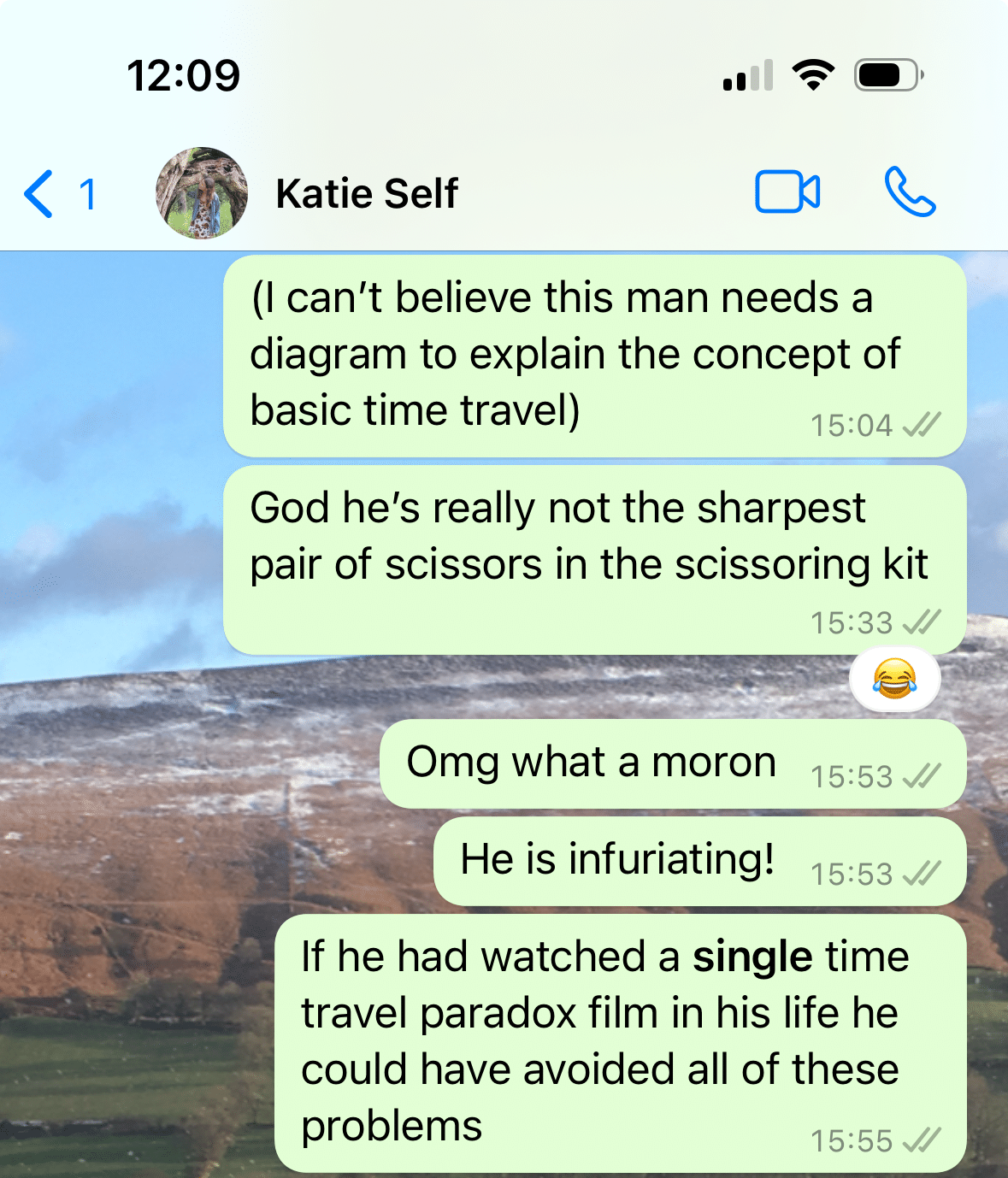
Héctor, much like Macbeth, is not a smart man. If we tastefully set aside the question of why he chooses to sit on a deckchair in his back garden staring at some secluded woodland through binoculars (everyone needs a hobby, I guess) the main problem with Héctor is that he has clearly never watched a single time-travel film in his life. Not even Back to the Future.
As a result he is unforgivably slow to understand the basic concepts, even when another character draws him a Time Travel for Dummies diagram in marker pen, and goes out of his way to alienate everyone he meets. The only saving grace is that he does eventually get the hang of things, even by that point he has blood on his hands. More of a bumbling idiot than a mad plotter.
Who did you see it with?
Nobody, although since Katie recommended it (as a sequel to fellow low-budget time travel thriller Primer) she got my real-time reaction.
Anatomy of a Fall
Justine Triet’s Oscar-winning French film (Anatomie d’une chute), which you should definitely watch if you haven’t already because the more people to swap theories with the better.
What’s it about?
Superficially, a courtroom drama about whether Sandra Voyter, a successful author, murdered her husband in their French chalet while their son, Daniel, was out walking the dog through the snow. But in fact (spoiler alert!) it’s impossible to know, and so the film is really about our own perceptions of two people in a marriage, culture and language (she is German, he is French, they speak English) and the stories we all construct to make sense of a consuming, fragmentary world.
But… honestly, I’m not ashamed to admit that it’s also just a lot of fun to watch as a whodunnit and then spend hours arguing about it with other people.
Idiocy analysis
Everyone here is too smart and thoughtful for any idiocy, although the French legal system does come across as bafflingly obtuse. To my mind, it’s extremely clear that – even if you’re sure she killed him! – the evidence is all circumstantial supposition and never even approaches ‘beyond reasonable doubt’ territory, so I’m not sure what they’re even doing in a courtroom. I’m sure this reflects an overly-romantic image of English prosecutors, though. In reality Sandra would probably still be stuck in a backlog and waiting for the case to reach trial.
Who did you see it with?
My mum, after a crab-laden dinner at Big Cheeks Thai, on the night she stayed over. We had to pause several times for discussion breaks.
The Picture of Dorian Gray
Sarah Snook’s amazing one-woman performance in which she plays all of the characters from Oscar Wilde’s 1891 novel.
What’s it about?
Dorian Gray is young and beautiful. He falls under the corrupting influence of Lord Henry Wotton, a cynic who advocates hedonism with a string of one-liners which would do extremely well on any social media platform today. Frustrated that he will grow old while his portrait will stay youthful, Dorian sells his soul in return for keeping his good looks forever and allowing the portrait to age in his place. It doesn’t go well.
Idiocy analysis
Well, Dorian himself is obviously not going to win any prizes for wisdom, but that’s the whole point: he’s a naïve innocent who quickly becomes selfish and cruel. But the real idiots are surely the story’s Victorian critics, who first tried to censor the homoeroticism (not very successfully) and later attacked Wilde, including in court, for the book’s indecency and immorality. Guys: please try to follow along to the end. The hedonist ends up dead.
Who did you see it with?
Kira, although this time it was my idea. And yes, of course I wouldn’t have gone had it not been for Succession, but Sarah Snook delivered with huge energy going into such a range of characters. The staging also really leaned into a knowing commentary on modern life, especially with Snook’s livestreamed selfie videos, which I thought served the story well.
Other highlights of March include: another wonderful evening with Karol at Tayyabs in Whitechapel, a truly delicious date night with Randi at a fancy tapas place (still thinking about that black squid rice), the unbearable tension of the nail-biting Lewisham mayoral by-election and a gentle evening of Carcassonne with our neighbour Adrienn.
I also administered lots and lots of ‘Life in the UK’ practice tests for Randi in the run-up to her exam – final spoiler: she passed! 🥳 – which occasionally veered into such pure pub quiz territory (e.g. where was Handel born?) that we couldn’t stop laughing at the absurdity. Finally, on Friday night I took Matthew on a spooky night tour of the Waterlink Way, followed by dinner and music at the Honor Oak pub. The next morning I headed up to West Hampstead to hang out with Josh and Cora and to return Cora’s cat, which I accidentally stole last time I saw them!
Once again, it’s time for my annual reading review, i.e. the moment when declining to rate any books on Goodreads is finally rectified. It hasn’t been a peak reading year, to be honest, with a lowly total book count of 28 (my lowest since 2014) and a failure to find that one standout story which really whisked me off my feet and took me somewhere dazzlingly, thrillingly new. Nevertheless there are a lot of good, solid entries below, with lots to recommend if you’re making your own plans for 2024.
Fiction
I’m usually pretty good at picking my first book of the year, but ended up with very mixed feelings about Hilary Mantel’s Wolf Hall. It’s definitely a novel I’m ‘supposed’ to like, but it took me over a month to slog through it and with such a large cast of characters it’s irritating to deal with the unnecessarily added complexity of having to puzzle out exactly who is speaking (which is often unclear). That said, it’s also the kind of book which improves on reflection and, after reading some helpful reviews, I came to appreciate this portrayal of Thomas Cromwell – a self-made, wry, pragmatic rationalist – as some kind of anachronistic emissary from modernity. Mantel is also very good at conveying the human drama of Tudor politics, particularly in the scenes with a humiliated, angry young Mary.
One of my honeymoon reads was Death’s End, the final entry in Liu Cixin’s Remembrance of Earth’s Past trilogy. It’s a brilliant series, of immense scope, and the third book continues to explore complex science fiction concepts over many future eras of humanity, including a memorable section featuring three densely metaphorical fairy tales which continue to haunt me. In fact, there’s an inescapable melancholy to a lot of this trilogy – difficult to avoid when you’re dealing with the end of the universe, I guess – so if you’re looking for an uplifting location to read the very last page, I can heartily recommend (from personal experience) that a heated pool overlooking the magnificent forests of Guatapé, Colombia will do the trick.
Another (quite different) honeymoon read was The Seven Husbands of Evelyn Hugo, by Taylor Jenkins Reid. This is a highly enjoyable, fast-moving page turner with an intriguing set-up: former Hollywood star Evelyn Hugo, now a recluse, handpicks a young, inexperienced journalist to spill her life’s secrets to. But why her? Spoiler: there is a shock ending, which is all part of the fun even though it feels awfully contrived. There is no shock ending to Woman at Point Zero – a very different kind of book – first published in Arabic by Nawal El Saadawi in 1977. But it’s written with bracing clarity and can be read as a gripping page turner of its own, even though you know from the very beginning exactly what will happen to Firdaus. Based on a real person, she is female prisoner condemned to death for murdering her pimp who nevertheless retains her own fierce dignity as she tells her life story.
I was not overly impressed by The Committed, a sequel to Viet Thanh Nguyen’s The Sympathizer. A thriller is supposed to have some thrills, but everything is weighed down by a lot of laboured intellectualism and compared to the original book it left me cold. On the contrary, A Visit from the Goon Squad is the Jennifer Egan book which I should have read last year when I plumped for Manhattan Beach, and I’m grateful for Todd and Carolyn’s quizzical raised eyebrows in convincing me to go back and try this one out instead. I enjoyed this a lot more, even though the punk rock / music industry setting was not initially appealing, and I appreciated the unusual interlinked short-story structure to the book once I understood that’s what was happening and I wasn’t just struggling to keep track. Also, as soon as I finished I immediately thought that it would be really useful if somebody had made a diagram of how all of the characters and storylines intersect, so kudos to the many people on the internet (here’s a good one!) who have of course already done that.
Confession time: I don’t think I will ever be the right target audience for Lauren Groff’s Matrix. I did try! In fact, the omens were good when I started on the intriguing first chapter, curled up on a comfy chair in the top floor of Chicago’s Open Books bookshop. What’s this? Lauren Groff’s new book is set in a 12th century English abbey? But try as I might, this study of intense religious mysticism and slow-burning sexuality was never going to make my list of favourites, even though I can recognise it as objectively good writing. To embarrass myself further, I even paused reading it halfway through to binge on the newly-released Comoran Strike instalment, which is a bit like sneaking out of the back of a high-end Chicago restaurant to go eat at Chick-fil-A. But, man, it was good.
The Running Grave is easily categorised as ‘the one where Robin infiltrates a cult’, which (a) keeps the tension very high throughout, (b) is a good strategy to plausibly prolong the Strike/Robin relationship, (c) is occasionally tiring and you wish she would just get out sooner. Less so than the last book, but I still found the ending a bit of a problem: everything seems to collapse and resolve itself more quickly than you’d expect, and there’s no big showdown with the cult leaders. Of course, all of this is quickly forgotten with the big cliffhanger ending… which I do fear will be easily glossed over again at the start of the next book. We shall see.
I do understand and respect those who no longer wish to read JK Rowling. For me, the most extreme example this year where the personal failings of the author really intruded onto the work itself came when reading Isaac Asimov’s The End of Eternity. Asimov’s sexism shouldn’t be a surprise to anyone who’s read his books (although the extent of his personal criminality is awful) but in this story his refusal/inability to write a realistic female character in Noÿs Lambent really undermines a promising sci-fi concept. Anyway, this book is the story of the ‘Eternals’, an elite, arrogant organisation who meddle in humanity’s timeline and, intriguing, also facilitate commercial trading between different eras. So, think of the ‘Observers’ from Fringe with a little dash of the WTO thrown in for good measure. Despite the character flaws, I appreciated the Cold War-era vibes (this is definitely a critique of central planning, amongst other things) and the philosophical charge of the book’s final line.
For a more sophisticated imaginings about politics under the guise of science-fiction, try Ursula Le Guin’s The Dispossessed from 1974. Anarres is a moon orbiting the planet Urras. Resources are scarce, but society is successfully organised under an anarcho-syndicalist model after being founded by a one-off set of idealistic colonists from Urras several centuries earlier. I do believe there is a strong case for authors to write utopias – not just the more common dystopias – and this classic of the genre is a very credible attempt to explore a somewhat-believable anarchist utopia. Guin does a superb job at balancing a genuinely attractive form of communism with the reality of how utterly crushing it would likely feel if you were not brought up in it, and I think the interwoven nature of politics and culture is the real point of this book. The relationship between Anarres and Urras also made sense to me, and the language and worldbuilding is top class: the ‘dispossessed’ of the book’s title are poor but also reject possessions, unlike the ‘propertarians’ of Urras. The plot itself, as so often in these types of books, is less compelling.
In contrast to Le Guin, Celeste Ng’s Our Missing Hearts is a much more ‘standard dystopia’ and I found it a little rote. Don’t get me wrong, it’s well-written and a perfectly compelling read, but the implementation of PACT (Preserving of American Cultures and Traditions Act) felt cartoonish and contrary to everything we know about how American society actually works. In this novel, the US is rapidly transformed (by ‘The Crisis’) into a deeply repressive, authoritarian state with virulent racism directed against Asians. My issue is obviously not that there isn’t a lot of racism against Asian Americans already (of course there is), nor that a society couldn’t transform at frightening speed (of course it could) and, of course, everybody knows the American state has form when it comes to enforcing racism through terror. I just didn’t buy this telling of it. American society is so noisy and fragmented that a clean, wholesale transition to this New Order is too unsubtle, too straightforward, and not hypocritical enough. That said, and maybe this sounds contradictory, I did really enjoy reading it. So please read it too, and then we’ll see if I’m the only one who feels this way.
The Man Who Died Twice – the second in Richard Osman’s Thursday Murder Club series – is a fun read, but I do think his instinct that all his characters are so arch and ironic all the time ends up undermining the individual characterisations. It also removes jeopardy when everyone manages to be suave and unruffled in the face of all threats. Well, I say that, but most characters remained pretty unruffled in Agatha Christie’s cracking The Body in the Library and it was still excellent. I also chuckled to myself at her insertion of a character praising Agatha Christie as one of the great crime authors of the day… so maybe I should just fully accept the Thursday Murder Club books on the the same cosy terms.
Sally Rooney’s Conversations with Friends was very enjoyable. To steal brazenly from another review, her characters “zig where you’d expect them to zag” and I found that to be very true: there’s something about her writing which sends these relatable human moments into unexpected directions. This year I also went back to Ishiguro (but I really am running out now) for An Artist of the Floating World, which is set in post-war Japan and centred on an elderly painter whose former reputation is now tarnished by his actions during the war. This is exactly what you’d expect from Ishiguro and nothing less: unreliable narration and memories mingled with guilt, denial and misdirection about the past.
By challenging all of my skills of emotional repression, I have successfully subsumed any desire to read the third in Patrick Rothfuss’s Kingkiller Chronicles trilogy into a Schrödinger’s box of anticipation: it won’t be there until I look. In that spirt, I enjoyed his yet-another-diversionary novella, The Narrow Road Between Desires, as an evocative ride through a day in the life of Bast. It helped that I hadn’t read the short story of which this is a slightly-longer revamp. Talking of novellas, this year my Rivers of London diet was limited to the new Winter’s Gifts sidequest featuring FBI Special Agent Kimberley Reynolds. This was fun (giant tentacles emerging from the ice!), but let’s be honest and agree that Kimberley is a weird mishmash of American stereotypes which don’t quite come together as a convincing person. Oh, and on New Year’s Eve I snacked on Philip Pullman’s The Collectors, a spooky short story from the worlds of His Dark Materials with little hints about the early life of Mrs Coulter.
Finally, I had a lot of fun with Ben Elton’s Time and Time Again, and am still impressed by the little twist in our assumptions about the timeline which is revealed near the end. To summarise the conceit: a secret society of Cambridge academics, with a nostalgic yearning for the lost greatness of European society destroyed by WW1, find a way to send ex-solider Hugh Stanton back in time to prevent the assassination of Franz Ferdinand and then, for good murder, kill the Kaiser. Spoiler: this is not a good plan. One slight issue I have with this book is that I think Ben Elton wants to skewer the ‘Great Man of History’ school of history in favour of wider social and economic forces, but then his actual plot ends up making the ‘wider social and economic forces’ brigade look like a bunch of idiots since minor historical changes (again, spoiler alert) end up having utterly massive implications. So the real lesson ends up being ‘obviously you can’t just fix the twentieth century by shooting the German Emperor in the head’, which I think we knew already. But who cares? It’s super fun and I want a turn with the time-travel history-messing toy now.
Oh, and one evening – inspired by Angela downstairs, I think! – Randi and I decided to read The Importance of Being Earnest out loud as a piece of old-fashioned entertainment. I enjoyed this, and we should do it again, but next time we should either pick a two-handed or rope some other people into joining us so we don’t have quite so many characters to cover…
Non-Fiction
Beyond Weird was my first non-fiction book of 2023, and in my mind is indelibly linked to the physical sensation of reading it from a hammock on the front porch of our homestay in Colombia, after the sun went down, on the first night of our trek. For a funk-inducing guide to quantum physics and the deep mysteries of nature, this felt very appropriate. Quantum physics is a common subject for popular science books – precisely because it’s so weird and counterintuitive – and although this book strives to move beyond the clichés (hence the title!) there’s still something shocking about, say, the double split experiment – no matter how many times you’ve read it before. Anyway, this was a great book and highly recommended whether you’re new to this world or not.
Joanne B. Freeman’s The Field of Blood: Violence in Congress and the Road to Civil War is one of those books which I picked up as a recommendation from The Ezra Klein Show years ago and finally got around to reading this year. It’s also one of the most ‘history’ history books I’ve read in a while: sticking to a carefully defined domain (physical violence in the US Congress during the antebellum years) and inspired by a close reading of a primary source (the diaries of Benjamin Brown French, a clerk in the House of Representatives). French himself is an interesting figure precisely because he himself is historically insignificant and largely goes with the flow, starting off by seeing the abolitionists as a radical, disruptive influence and then slowly shifting as the political realities shift around him. These type of people are, of course, much more common than the few unusual characters who usually make it into popular political histories.
Anyway, my main takeaway from this book – and this may not shock anyone – is that it doesn’t actually seem that Congress itself was inherently violent, at least for the time, but rather that the representatives of the South in Congress were unusually and exceptionally violent! Given that they were representatives from a monstrous society based on plantation chattel slavery this doesn’t seem all that surprising, but I think it’s worth pointing out since it reminds me of the equally absurd equivalences drawn between Democrats and Republicans in Congress today. Whatever you think of them, they really aren’t just neatly symmetrical mirror images of each other.
Skipping forward to much later American politics, Robert Draper’s To Start a War: How the Bush Administration Took America into Iraq is, well, exactly what the subtitle says it is. This is very much a personal story of individual decision-making and organisational politics gone wrong rather than a big-picture geopolitical account. As a result, some of the most interesting parts (at least to me) are those things which might have broader lessons for organisational culture. For example, I was intrigued by Bush’s management style: he wanted brisk, efficient meetings where the people under him presented a consensus view which they had already hashed out between themselves. In the context of the Iraq War, this seems obviously dangerous, as it was far too easy for complications, caveats and opposing views to be squashed before ever coming close to the President. Then again, I can easily imagine the opposite style being critiqued elsewhere for its meddlesome micromanagement! (Sigh… this indecision is why I’m not destinated to write the next bestselling airport book for aspiring middle managers.)
I bought Africa Is Not a Country in a bit of a bookshop panic: that feeling when you’re overwhelmed by choice, overwhelmed by all of the books on your to-read list already and just want to take a punt on something unexpected. It paid off, because this collection of essays by Dipo Faloyin was an absorbing read, covering topics from the profoundly negative legacy of nineteenth-century European borders in to today’s intensely competitive West African rivalry over how to make the perfect jollof rice. His wider point, which is not new but always worth making, is to push back against very harmful and totalising narratives of the entire African continent. Of course, the only way to do that successfully is to familiarise more readers with specific people and places.
As a meta-point: Faloyin’s background is as a senior editor at VICE and you can really tell that he grew up writing for online audiences. I wish more non-fiction book authors would embrace the flexibility which results from this style. The chapters in this book vary dramatically in both tone and length, with no attempt to enforce an unnecessary consistency. If the chapter is done, it’s just done.
I laugh at myself when it comes to Homage to Catalonia, which is (of course) George Orwell’s first-hand account of his time spent as a volunteer fighter in the Spanish Civil War. Famously, this doesn’t include an awful lot of fighting, and Orwell successfully captures the sense of boredom, frustration and futility which pervades the conflict. In the original edition, Orwell includes two ‘background’ chapters about the wider political situation and the internecine feuds between the Communists backed by the USSR and Trotskyist groups such as POUM, which is the group that Orwell himself had joined. Later, Orwell requested that these chapters be moved to become two appendices at the very end of the book, and apologetically notes that future readers may find them outdated and uninteresting. Most modern Goodreads reviews seem to agree, but for me these were by far the most interesting part of the book! I’ll take obscure political manoeuvrings over a description of what it’s like to get shot in the neck (spoiler: unpleasant) any day.
I hadn’t seen any TV series or film about the 1986 Chernobyl disaster, so Adam Higginbotham’s Midnight in Chernobyl: The Untold Story of the World’s Greatest Nuclear Disaster had the advantage of giving me all the facts and characters afresh. It’s a totally compelling thriller with so many sad and shocking stories, especially when a piece of personal heroism or self-sacrifice turns out to have been completely pointless. The moment which stuck with me most vividly came soon after the explosion when three engineers are investigating the state of the reactor, pass through an airlock, stare right into the core of the reactor and – within seconds – are suddenly exposed to utterly fatal doses of radiation. Worse, at least one of them is a veteran of nuclear submarines and immediately understands that he is now doomed to die, and soon. It’s chilling.
As a veteran listener of Tim Harford’s Cautionary Tales podcast, the immediate cause of the accident is also so familiar. A series of small mistakes, bad decisions and the understandable desire to just get a routine late-running test over and done with: all things which, on their own, wouldn’t have amounted to anything but just so happened to come together that night in the most awful way possible.
Finally, a massive thanks to Kira for gifting me I Love Russia: Reporting from a Lost Country. This is a collection of journalism by Elena Kostyuchenko, a Russian reporter for the Novaya Gazeta newspaper who is now barred from returning to her home country after covering the war in Ukraine. In the book, short autobiographical segments are used to preface much longer essays from her career, covering everything from squatters living in Moscow’s huge, abandoned and very creepy Hovrinskaya Hospital (since demolished) to a community of sex workers working overnight by the side of a highway and her own brutal experiences of attending Gay Pride marches in Russia. A very moving collection.
